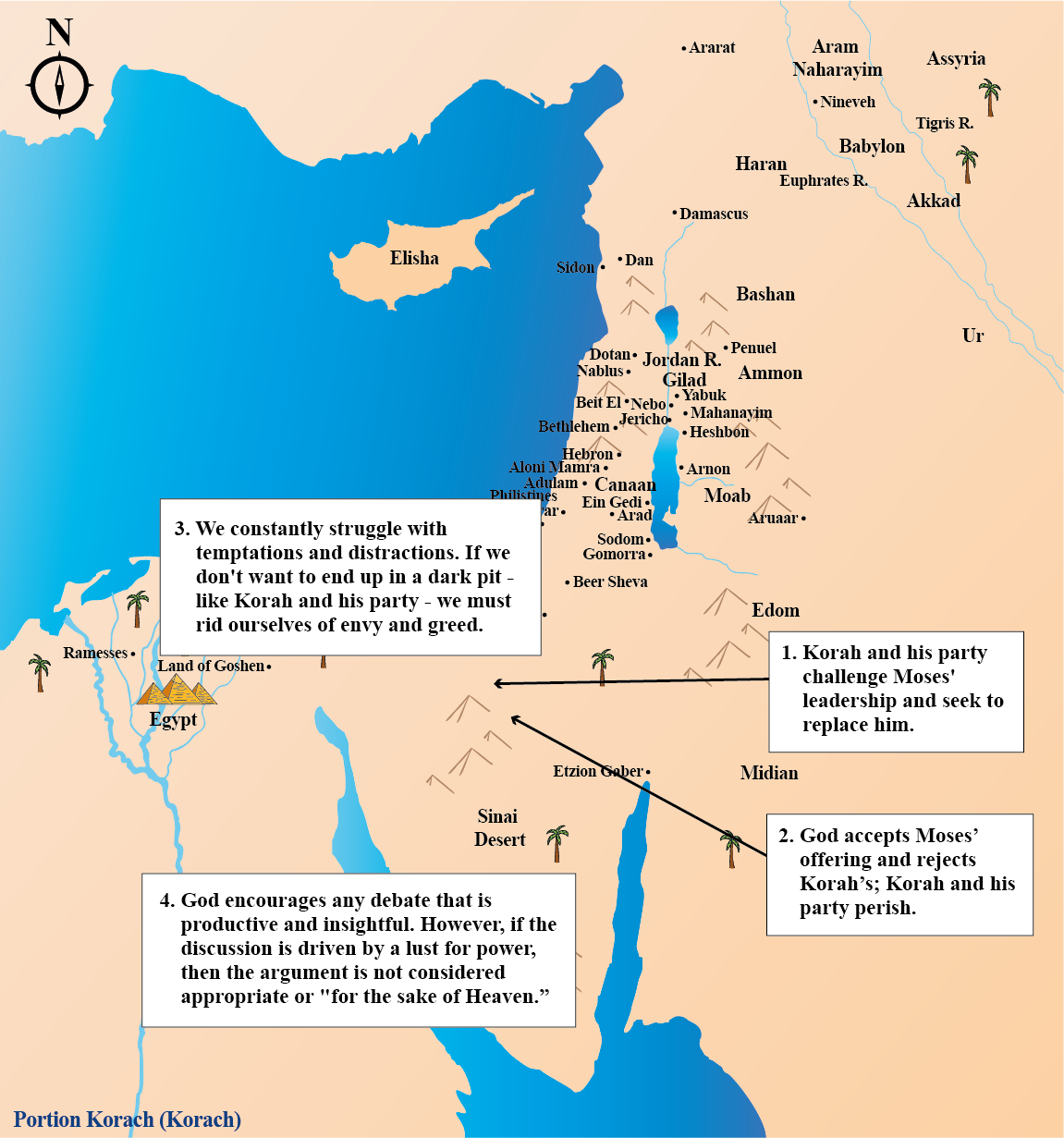
Korah plots an uprising; Moses arranges a test for God to determine who will be His emissary
“And they rose up before Moses, with certain of the children of Israel, two hundred and fifty princes of the assembly, famous in the congregation, men of renown: And they gathered themselves together against Moses and against Aaron, and said unto them, Ye take too much upon you, seeing all the congregation are holy, every one of them, and the LORD is among them: wherefore then lift ye up yourselves above the congregation of the LORD? And when Moses heard it, he fell upon his face: And he spake unto Korah and unto all his company, saying, Even to morrow the LORD will shew who are his, and who is holy; and will cause him to come near unto him” Numbers 16:2 – 7
- Korah challenges Moses and Aaron’s authority. He stirs controversy and plots an uprising. Indeed, Korah has legitimate claims to priesthood – due to his hereditary lineage as a member of the Levite tribe – but his opposition is an affront to God’s decision. Though Korah possesses wealth and comes from an honorable family background, he wants more power. “And which is the controversy that is not for the sake of Heaven? Such was the controversy of Korah and all his congregation” (Mishnah, Tractate of Avot 5:7).
- A controversy “for the sake of Heaven” is one whose only goal is to seek truth. Korah’s arguments, however, are based on materialism and egotism. He isn’t pursuing truth; he is pursuing power. Argument is a big part of Jewish canonical texts. Debate should be encouraged. Indeed, God supports any debate that is productive and insightful. However, if the discussion is driven by a lust for power, then the argument is not considered “for the sake of Heaven” and is therefore not appropriate.
The earth opens its “mouth” and swallows Korah and his party
“And Moses sent to call Dathan and Abiram, the sons of Eliab: which said, We will not come up:
Is it a small thing that thou hast brought us up out of a land that floweth with milk and honey, to kill us in the wilderness, except thou make thyself altogether a prince over us? Moreover thou hast not brought us into a land that floweth with milk and honey, or given us inheritance of fields and vineyards: wilt thou put out the eyes of these men? we will not come up.” Numbers 16:12 – 15
- Korah, Dathan, and Abiram all give in to their temptations instead of embracing two important attitudes: self – control and modesty. To reach a position of leadership, one must invest effort and perfect their traits and spirit. Subversion and a lust for power lead to chaos and self – destruction. If we succumb to our desire for wealth and influence, we will become captives of our inner dark forces. That is why Korah’s punishment is to fall into an abyss that opens beneath his feet – it is a lesson about how envy can “swallow us up.”
Pearls of Divine Wisdom: “Korah”
- The purpose of each individual’s life is to reach collective sanctity. However, this realm is divided into several subcategories, so as to allow people of different levels to enjoy an overall spiritual state of perfection.
- We constantly struggle with temptations and distractions. If we don’t want to end up in a dark pit – like Korah and his party – we must rid ourselves of all forms of envy and greed.
- When we rid ourselves of envy and greed, we not only improve our own personal situation, we also facilitate others’ journey to perfection.
- A controversy “for the sake of Heaven” is one whose only goal is to seek truth. Korah covets power and honor – and as such, his arguments are based on materialism and egotism.
- God encourages any debate that is productive and insightful. However, if the discussion is driven by a lust for power, then the argument is not considered “for the sake of Heaven” and is thus not appropriate.
- Subversion and a lust for power lead to chaos and self destruction. God honors the meek and humiliates those who lust power. Grandeur is a privilege granted exclusively to those devoted to spiritual work.

Pursuit of truth means not only looking outward, but also inward; our life’s mission is to discover truth.

